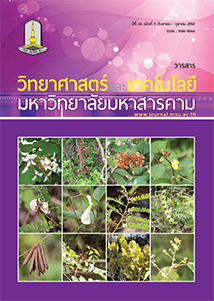Project Based Learning of Teaching Management for Advanced Epidemiology Course Students, Faculty of Public Health, Mahasarakham University
Main Article Content
Abstract
The study process was done using project - based learning in an advanced epidemiology course. A point cross - sectional analytic survey had been studied by 13 doctoral degree students, from the Faculty of Public Health. This research aimed to determine the results of the learning process, the learning satisfaction of students, and student moral, between September 2013 and April 2015.
The result showed that the learning process was evaluated in 3 parts. Part 1; The knowledge of advanced epidemiology was a pre - test (mean score = 3.5), and post - test (mean score = 10). Before learning, most of the students had a low knowledge score (<38.4%) in epidemiologic measurement, risk of disease assessment, sample size estimation and statistics. Part 2; Group and individual activities evaluated. (group score < 15.3 - 50.0%) Including methodology, study results, and research problems. Their activities after learning revealed that, 76.9 % had 100 scores. In, part 3 evaluation, after learning they had a low opinion of the lecturer was not pleasant to them (46.1%). Both scores of document support, and self study before class were the same (23.1%). After learning most had a high opinion level in the learning condition with a mean score of 4.18. The mean appreciaion score of 4.18 was at high level. Most moral scores consist of early to class, share idea, good explanations, clear presentations, and reasonable analysis. They had frequency and preparation of 52.2%, and 40.8% respectively.
Recommendation, students must develop their reading and study preparation before class. In addition, because of team work problems related to their basic education differences, past experience, and their duties, they should devote their time for team work in both theory and practice.
The result showed that the learning process was evaluated in 3 parts. Part 1; The knowledge of advanced epidemiology was a pre - test (mean score = 3.5), and post - test (mean score = 10). Before learning, most of the students had a low knowledge score (<38.4%) in epidemiologic measurement, risk of disease assessment, sample size estimation and statistics. Part 2; Group and individual activities evaluated. (group score < 15.3 - 50.0%) Including methodology, study results, and research problems. Their activities after learning revealed that, 76.9 % had 100 scores. In, part 3 evaluation, after learning they had a low opinion of the lecturer was not pleasant to them (46.1%). Both scores of document support, and self study before class were the same (23.1%). After learning most had a high opinion level in the learning condition with a mean score of 4.18. The mean appreciaion score of 4.18 was at high level. Most moral scores consist of early to class, share idea, good explanations, clear presentations, and reasonable analysis. They had frequency and preparation of 52.2%, and 40.8% respectively.
Recommendation, students must develop their reading and study preparation before class. In addition, because of team work problems related to their basic education differences, past experience, and their duties, they should devote their time for team work in both theory and practice.
Article Details
Section
Original Articles


